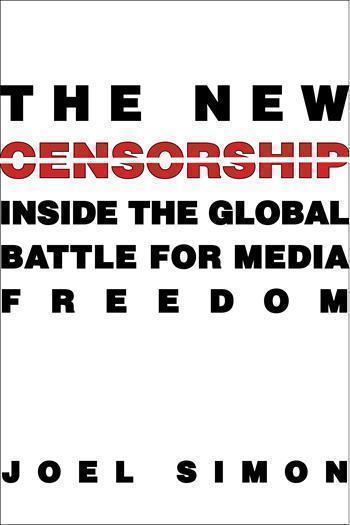Journalists are no longer special.
That is Joel Simon’s sad but all-too-true assessment of why journalists are becoming an endangered species in many parts of the world. By CPJ’s count 60 journalists around the world were killed in 2014.
“We live in an information age, and yet the people who bring us this information have never been so vulnerable,” Simon, the Committee to Protect Journalist’s executive director, said at Washington’s Politics and Prose bookstore, where he signed copies of his new book, The New Censorship: Inside the Global Battle for Media Freedom, on Jan. 5.

The New Censorship by Joel Simon.
Simon’s point is that media institutions no longer have the capacity to physically protect their journalists in many dangerous environments. The idea that a reporter can still protect herself or himself in a war zone these days by wearing a vest emblazoned with the word “Press,” he said, “is laughable.” Because anyone with a connection to the Internet can publish news reports and commentary, the traditional, paid journalist is less necessary and in some settings just another Westerner to be kidnapped for ransom. And the idea that a journalist can persuade kidnappers that he or she is useful to them “to tell their side of the story” is equally laughable now.
“The power dynamic has shifted,” Simon said. “The monopoly that protected journalists has evaporated.”
And it’s not just in war zones or closed media environments such as China’s or Turkmenistan’s where reporters face murder, imprisonment, censorship, and harassment. Popularly elected governments from Turkey to Venezuela are turning their followers against the media, making it ever less likely that mistreatment of journalists will result in any public outcry. Simon cited Turkish President Recep Tayyip Erdogan and Venezuela’s late leader Hugo Chavez as examples. Ecuador’s Rafael Correa and Russia’s Vladimir Putin also fit the mold. Simon calls these leaders “democratators.”
“Deprived of an ideological basis for state control of information since the collapse of the Soviet Union, the democratators have adapted to the new global reality,” Simon writes in The New Censorship. “Instead of relying on brute force and direct control, they use stealth, manipulation and subterfuge.” While some old-line dictatorships survive, such as Cuba and North Korea, which control their domestic media, “today’s autocrats generally seek to hide their policies behind a democratic facade and thus become part of the international community.”
To preserve the global information ecosystem, the international media support community must continue to vigorously help journalists everywhere to resist these pressures.

Comments (0)